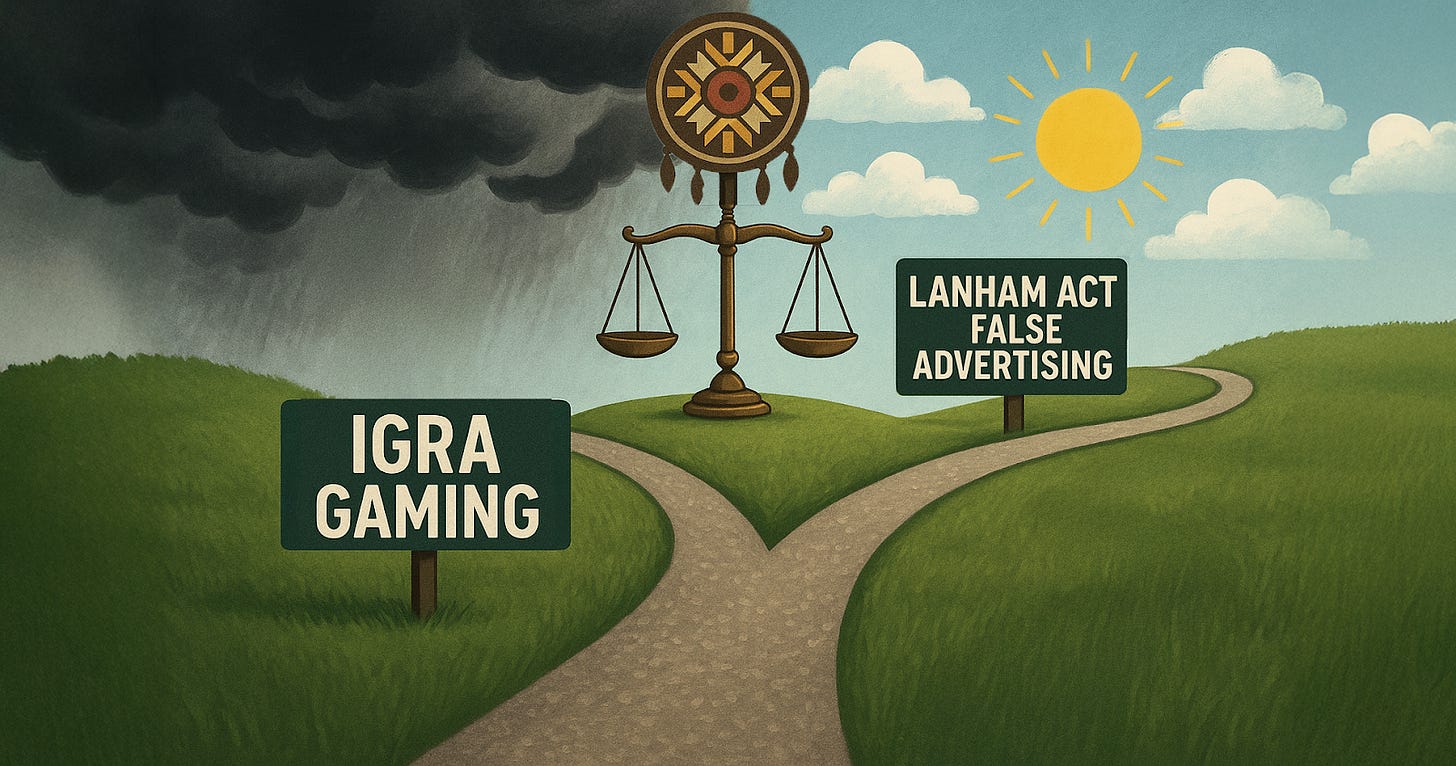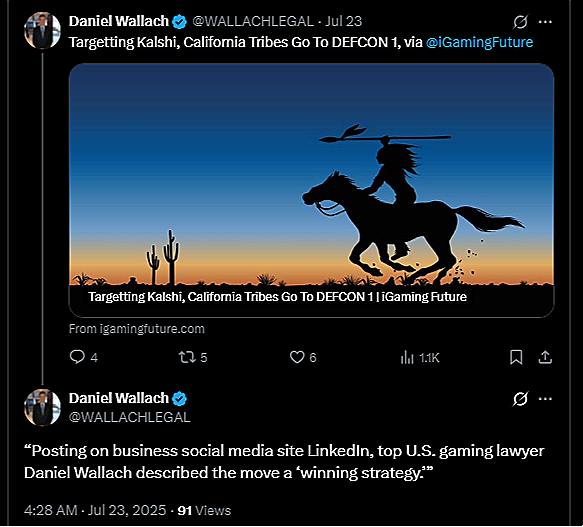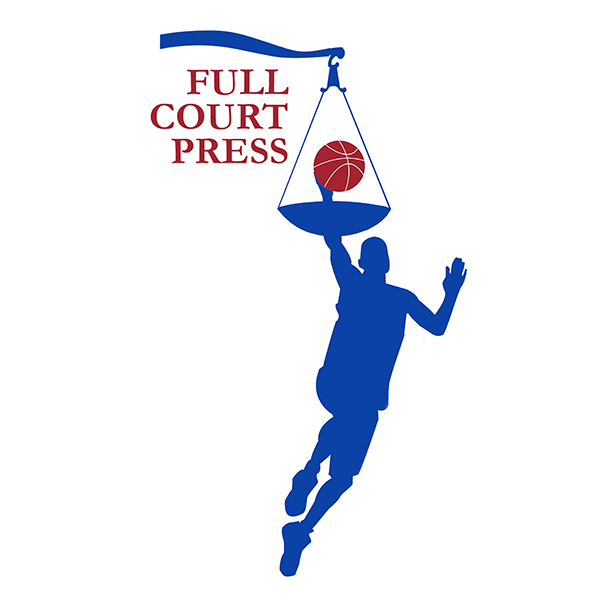Sports Markets Are Heating Up
Part II - Tribal gaming vs. prediction markets: The false advertising claim that might actually stick
⚖️ More Litigation on the Horizon
Back in 2013, we ghostwrote a petition to the Supreme Court (VIDEO), asking:
Is sports performance an excluded commodity under the Commodity Exchange Act?
We also made a prediction:
Absent immediate clarification by this Court, our nation will enter into another period where the courts are clogged with decisions that are inconsistent and conflicting with each other.
Twelve years later, that prediction is playing out in real time. Kalshi is embroiled in litigation in Nevada, New Jersey and Maryland. We recently filed an amicus brief in the New Jersey case. Then, there are the five more cases brewing in various states–and now, there’s a new one: Three tribes sued Kalshi and Robinhood.
Wallach believes this suit might be the winning strategy:
Maybe. Our position? Right suit, wrong legal theory.
🧩 IGRA and the Limits of Class III Gaming
Why do we think the tribes’ legal theory is wrong? Here is why:
Sports event contracts do not constitute Class III Gaming under IGRA.
Andrew Kim–writing as a guest on Dustin Gouker’s Event Horizon–accepts that premise without questioning it. But it’s worth revisiting the statute’s origins:
IGRA was enacted in response to Cabazon, a case focused on bingo and poker.
The statute itself never mentions sports gambling.
So whether you’re an originalist or textualist, the outcome’s the same. The tribes may rely on regulations with the force of law, but where those regs attempt to fill gaps left by a silent statute–especially post Loper Bright–courts will likely favor the statute.
In fact, prediction market counsel will probably riff on a version of the following argument at some point in the future:
If Congress intended IGRA to cover sports gambling, it would have said so.
And they’ll likely highlight the same line-drawing chaos Kalshi already leveraged. Remember what they said in their Maryland supplementary brief:
If Defendants were correct, there would be no logical endpoint to states’ authority to regulate trading on federal exchanges.
True. Precisely why it’s simpler and legally sound to conclude:
Tribes have never had jurisdiction over sports gambling of any kind.
🏷️ What About The Lanham Act?
The tribes are also leaning into a false advertising argument via the Lanham Act. Will that stick?
Kalshi’s messaging is certainly murky at best.
“Bet on anything”--no wait, “Trade on anything.”
Gambling? C’mon, the CEO doesn’t “know what this has to do with gambling.
Sports betting legal in all 50 states on Kalshi? Nope, the “odds” and “bet” advertisements have nothing to do with whether the company offers gambling.
If this is not false advertising, we don’t know what is. But there is a potential roadblock. As Andy Kim aptly observes, to prevail on a false advertising claim, you have to show likely injury from a false ad (actual injury is not needed under 15 U.S.C. § 1125 (a)(1)(B), but likely injury is):
In other words, the Tribes’ Lanham Act grievance is that Kalshi is wrongly advertising itself as “a legally compliant sports betting platform,” Compl. ¶ 226, but the Tribes themselves aren’t in the space. The Lanham Act requires you to show that you’ve been injured by the allegedly false advertisement. You don’t need to be direct competitors (so sayeth the Supreme Court), but you still have to show some kind of direct injury. We’ll see how the Tribes make that showing, especially in light of the allegation above. I wouldn’t count out the Tribes in finding a way, especially given the unique issues relating to their sovereignty.
Said another way, Kalshi’s alleged misstep was: Advertising itself as a “legally compliant sports betting platform.” But the tribes don’t offer sports betting and that might create a problem according to Kim: The Lanham Act doesn’t require direct competition, but it does require some likelihood of market harm.
Andrew Kim cites Lexmark, a Supreme Court case. Here’s another relevant case: POM Wonderful LLC v. Coca-Cola Co. There, the Supreme Court set the stage from the get-go:
POM competes in the pomegranate-blueberry juice market with the Coca-Cola Company.
There you go. POM was in direct competition with Coca-Cola which was not a threshold matter that POM had to clear. Kim is saying that the tribes may need to clear that threshold issue first.
So, here’s the rub:
Do sports prediction markets actually compete with tribal gaming?
What about fantasy sports?
And more broadly, how do we define the market?
Yesterday, we made the observation that the tribes could consider making a similar argument, especially if the “DFS is a game of chance” argument goes nowhere, which it likely won’t.
More broadly, how do we know whether two companies are competing or not? In fact, this is a standard question that comes up all the time in the context of antitrust regulation. Is the relevant market:
Sports betting?
Sports gambling (traditional sports betting + daily fantasy sports)?
Gambling, full stop (sports gambling + casino gaming)?
At least one TV station, KCRA3 took the position that daily fantasy sports is competing with the tribes, something we’d cite if we were drafting the brief for the tribes. That’s not the tribes arguing they are in competition with DFS, it’s a third party, which has some weight.
You may also remember the argument Becky Quick made on CNBC: Sportsbooks are in direct competition with Kalshi. In that case, the overlap is obvious– it’s literally the same product operating under two different regulatory regimes. That happened because the CFTC simply failed to act in this space. First, it ceded regulation to the states and didn’t enforce Dodd-Frank. Now, it’s allowing Kalshi–and recently, Polymarket, with its recent acquisition of a U.S.-based exchange and clearing house–to list and trade sports bets.
Back to market definitions: The clearest head-to-head competition is between traditional sportsbooks and prediction markets. But we believe a broader view is sound. This is ultimately about gambling dollars, and it is quite reasonable to take the position that those dollars represent a competitive market, and that sports betting, DFS and casino gaming can be viewed as substitutable products within that space.
So let’s walk through the spectrum again–from the narrowest market definition to the widest competitive gambling universe:
Sports betting
Sports gambling (sports betting + daily fantasy sports)
Gambling, full stop (sports gambling + casino gaming)
It could be even broader if you factor in other entertainment options. In fact, if you play with ChatGPT just a little bit, it tells you:
In investor calls, Robins described the competitive landscape for sports betting as encompassing all entertainment choices consumers have.
Also, remember when FanDuel CFO, Matt King, was interviewed by Frontline/NYT:
NYT: So you see no reason for fantasy sports to be regulated by some government agency?
King: Our product is all about entertainment value.
Another exchange from the Frontline/NTY documentary (around 40:39 mark):
NYT: A Fanduel executive told me that daily fantasy sports is really all about entertainment. Why, then, would the government, and you in particular, decide to get involved in a product that is just about entertainment?
Schneiderman: Well, gambling is entertainment. People go to casinos to be entertained.
Are Broadway shows a substitute for sports events? At least one court took that position, stating:
Plaintiff has failed to explain why other forms of entertainment, namely other Broadway shows, the opera, ballet or even sporting events are not adequate substitute products. The fact that plaintiff chose to operate in a single market the most popular Broadway shows does not make it a relevant market for antitrust purposes.
But even if entertainment is defined more narrowly, it certainly is difficult to argue that gambling dollars are not interchangeable to a large extent. This is from the DraftKings website:
DraftKings is the only U.S.-based vertically integrated sports betting operator, powering sports and gaming entertainment for 50+ operators across more than 15 regulated U.S. and global markets.
Remember the three divisions they have: Sports betting, iGaming and daily fantasy sports. The Casino and iGaming vertical is not just a random business unit off to the side, it’s a reflection of the company’s thinking that all forms of gambling are connected to each other. So, Andrew Kim makes a good observation, but we don’t feel this stops the tribes.
Our position has always been that gaming-style gambling (casinos) is a state affair, while the contingent event contracts, regardless of what the contingent event is, are squarely in federal territory. That distinction aligns best with how we think about police powers, which is necessary for local safety. Games are a local phenomenon, contracts on future contingent events are not.
From there, the broader picture solidifies:
Yes, IGRA is federal law–but it grants state-type rights to tribes, i.e. gaming. Once you try to fit gambling into gaming (again, a core definitional issue), the CEA likely preempts.
Still, if tribes are losing business to sports event contracts, they seem to have a solid case under the Lanham Act (especially in states like California where sports gambling is already illegal).
Bottom line: We don’t think the tribes’ IGRA argument will stick, but their Lanham argument just might.
Also, litigation makes strange bedfellows. There may be companies out there similarly positioned to challenge Kalshi and Robinhood–not because of tribal sovereignty concerns, but because they’re in direct competition with prediction markets. Perhaps a CFTC-regulated exchange that restricts listings to contracts satisfying the economic purpose test could raise the issue.
What could that look like? At the end of the day, futures markets rely on speculators. But when speculative dollars chase outcomes like whether the CEO of Astronomer will leave in July or whether Obama will be arrested before 2027–rather than interest rate futures or other legitimate hedging tools–a casino culture starts to infect the entire system. It undermines hedgers, who need a healthy speculator base to manage risk efficiently. It harms the exchanges too, which are caught between commercial incentives and regulatory responsibility.
It’s still early days in the world of sports event contracts. The Lanham Act might be the better tool for the tribes as opposed to the IGRA argument. But they have yet another avenue they can pursue, which we will tackle in our next post.





